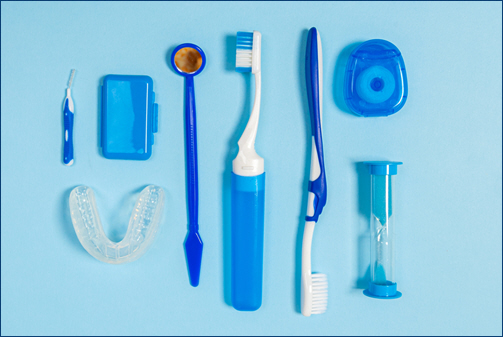Maintaining excellent oral hygiene at home is important for keeping your teeth and gums healthy between dental visits. Good home care helps prevent issues such as cavities, gum disease, and bad breath. Here’s a guide to essential home dental care practices that will help you keep your smile in top shape.
Brush Your Teeth Properly
 Brushing is the cornerstone of oral hygiene. Use a soft-bristled toothbrush and fluoride toothpaste to brush your teeth at least twice a day. The American Dental Association (ADA) recommends brushing for two minutes each time. Be sure to cover all surfaces of your teeth, including the chewing surfaces, outer and inner areas, and along the gumline. Replace your toothbrush every three to four months, or sooner if the bristles become frayed.
Brushing is the cornerstone of oral hygiene. Use a soft-bristled toothbrush and fluoride toothpaste to brush your teeth at least twice a day. The American Dental Association (ADA) recommends brushing for two minutes each time. Be sure to cover all surfaces of your teeth, including the chewing surfaces, outer and inner areas, and along the gumline. Replace your toothbrush every three to four months, or sooner if the bristles become frayed.
Floss Daily
Flossing is essential for removing plaque and food particles from between your teeth and under the gumline, where your toothbrush can’t reach. Daily flossing helps prevent gum disease and cavities. Use about 18 inches of dental floss, and gently slide it between your teeth, making a C-shape around each tooth. Avoid snapping the floss, as this can damage your gums.
Use Mouthwash
Incorporating an antibacterial or fluoride mouthwash into your routine can offer additional protection against plaque and decay. Mouthwash helps reduce oral bacteria, strengthen tooth enamel, and freshen your breath. Rinse with mouthwash after brushing and flossing to enhance your overall oral hygiene.
Maintain a Healthy Diet
What you eat plays a significant role in your oral health. Limit sugary and acidic foods that can contribute to tooth decay and erosion. Instead, focus on a balanced diet rich in fruits, vegetables, whole grains, and dairy products. Foods high in calcium, such as milk and cheese, help strengthen your teeth and bones.
Stay Hydrated
Drinking plenty of water throughout the day helps wash away food particles and bacteria from your mouth. It also aids in maintaining a healthy flow of saliva, which is essential for neutralizing acids and protecting your teeth against decay.
Avoid Tobacco Products
Tobacco use is linked to a host of oral health problems, including gum disease, tooth discoloration, and oral cancer. Avoiding tobacco products can significantly improve your oral health and overall well-being.
Check for Changes
Regularly inspect your mouth for any changes, such as swollen or bleeding gums, new sores, or persistent bad breath. Early detection of any issues allows you to address them promptly and seek professional help if needed.
Visit Your Dentist Regularly
While home care is essential, regular dental check-ups and cleanings are crucial for maintaining oral health. Your dentist can detect and address any problems early, provide professional cleanings, and offer personalized advice for your oral care routine.
Effective home dental care is key to maintaining a healthy smile and preventing oral health issues between dental visits. By brushing and flossing regularly, using mouthwash, maintaining a healthy diet, staying hydrated, avoiding tobacco, monitoring your oral health, and visiting your dentist regularly, you can keep your teeth and gums in excellent condition and enjoy a lifetime of good oral health.

